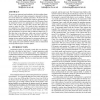Free Online Productivity Tools
i2Speak
i2Symbol
i2OCR
iTex2Img
iWeb2Print
iWeb2Shot
i2Type
iPdf2Split
iPdf2Merge
i2Bopomofo
i2Arabic
i2Style
i2Image
i2PDF
iLatex2Rtf
Sci2ools
ATAL
2009
Springer
2009
Springer
Altruism and agents: an argumentation based approach to designing agent decision mechanisms
We present an argument-based qualitative decision-making framework in which the social values promoted or demoted by alternative action-options are explicitly represented. We show how this framework may be used to explain the results of experimental economic studies in which human subjects play the Ultimatum Game, an interaction between two participants in which one player divides a sum of money between them, and the other player may accept or reject the offer. The results of these experiments are not explained by a decision-model assuming the participants are purely self-interested utility-maximizers. Some studies further suggest that differences in choices made in different cultures may reflect their day to day behaviour, which can in turn be related to the values of the subjects, and how they order their values. The decision-framework we propose will aid software engineers designing decision-making mechanisms for autonomous agents, particularly for situations requiring agent adapt...
Artificial Intelligence | ATAL 2009 | Qualitative Decision-making Framework | Situations Requiring Agent | Social Values |
Related Content
| Added | 26 May 2010 |
| Updated | 26 May 2010 |
| Type | Conference |
| Year | 2009 |
| Where | ATAL |
| Authors | Trevor J. M. Bench-Capon, Katie Atkinson, Peter McBurney |
Comments (0)

